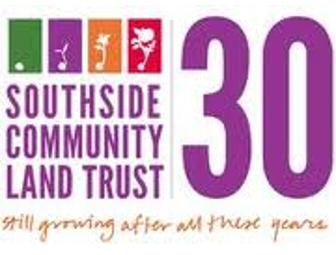SOUTHSIDE COMMUNITY LAND TRUST BENEFACTOR MEMBERSHIP

Item Number: 209
Time Left: CLOSED
Description
As a "Baby Greens" Benefactor Member, you will receive special benefits, including:
Entrance into the "preview hour" of the Annual Plant Sale (first dibs on all the perennials, annuals, and fruit and vegetable plant starts)
A 10% discount on everything purchased at the Annual Plant Sale
10% off select purchases (please see vendor for more details) at Avant Gardens, Briggs Nursery, Evergreen Tree & Landscape Service, Frey Florist & Greenhouses, Frog & Toad, The Good Earth Organic Gardening Center, Jephry Floral Studio, OOP!, Legend Bicycle, The Peaceable Kingdom, and Seven Arrows Farm.
Subscription to our print newsletter, Southside Green, and e-newsletter
Everyone needs access to healthy food. Since 1981, the Land Trust has been a forceful change agent for community food security, providing land, education, tools, and support for people to grow food for themselves in greater Providence, Rhode Island.
Our efforts have strengthened community, increased health, and enhanced the biodiversity of our natural environment. In collaboration with neighbors and community partners, we have transformed more than five acres of urban land into safe, healthy, and productive spaces to grow food, and preserved 50 acres of suburban farmland. Currently, with support from Southside Community Land Trust, over 600 families city-wide have transformed vacant lots and under-used land into a network of more than 30 productive inner-city community gardens. Our education programs engage a thousand youth each year in the wonder and art of hands-on gardening.
Southside Community Land Trust’s comprehensive urban agriculture programs empower growers of all ages, including children, youth, and adults with the knowledge, skills and facilitative support to harvest high yields of food from small spaces, and to build meaningful connections to one another and nature. The safe, beautiful, and productive spaces created at SCLT's community and school-based gardens, market farms, and education sites not only allow families to grow food, they also provide places for people to connect across economic and cultural divides to revitalize their neighborhoods, and for innovative farm businesses to thrive.